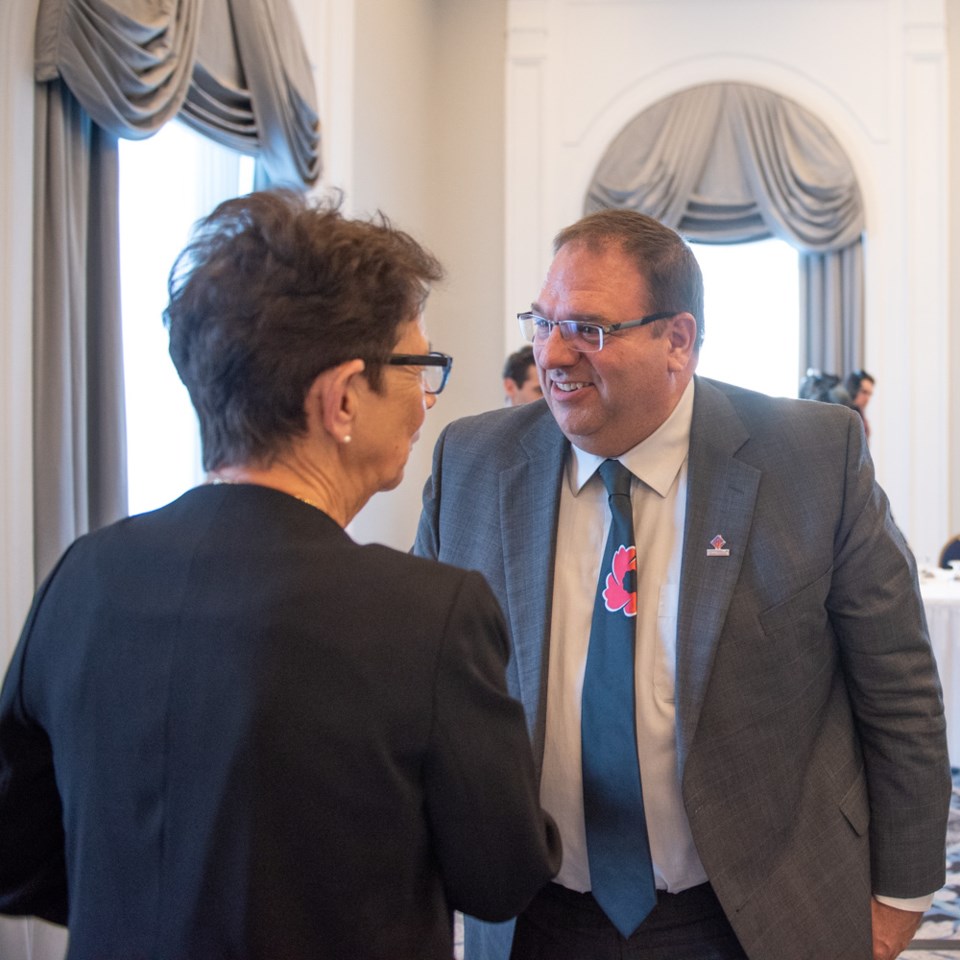Regina – Lloydminster Mayor Gerald Aalbers worked in the oilpatch for decades before becoming mayor of the Border City. He testified before the Senate Transport and Communications Committee in Regina on May 1, as part of their travelling hearings into Bill C-48, the Oil Tanker Moratorium Act. On May 15, the committee voted against the act, but it still has to be considered by the Senate as a whole.
Here is Aalbers’ opening statement, verbatim:
I am the mayor of Canada’s only bi-provincial city, Lloydminster, Saskatchewan and Alberta. It is my honour to speak to you on Bill C-48, this critically important issue that impacts the livelihoods of many Canadians families. As most of you know, Lloydminster is situated in the heart of heavy oil production in Canada. However, today, I am here also as a member of the Alberta Urban Municipalities Association and the sister organization in Saskatchewan, SUMA.
Lloydminster and all members of the Coalition of Canadian Municipalities for Energy Action are reeling from the devastating impact of this perfect storm of financial challenges. As an industry we have experienced the effect of low crude prices, differential challenges, a lack of pipeline capability and now, with Bill C-48, a potential ban on the opportunity to ship our oil to new markets.
As mayor, I have the privilege of representing a community that is proud of its petroleum and agriculture roots. In the past 30 years we have doubled in population all because of the economic growth and spinoffs of oil and gas production and agriculture. Whether our economy is allowed to flourish again and to grow into the future is left in your capable hands as you consider Bill C-48 and Bill C-69.
To provide you with some important context. I would like to share a few alarming statistics from Lloydminster and the surrounding area. Currently there are over 720 homes listed for sale, which represents 7 per cent of our total home numbers. Not so long ago we used to use a lottery system for the sale of new lots. Today there are 169 vacant lots waiting for development. Commercial and industrial vacancies have also skyrocketed. Many companies have had numerous rounds of layoffs.
Before I was elected mayor I worked in the oil and gas industry for 25 years in Saskatchewan, Alberta and British Columbia. I have seen hard times, and yet there is an incredible resiliency among those who work in this field. Right now they are struggling to make ends meet and in some cases they are failing. To be frank, I cannot recall a more difficult stretch for the oil and gas industry.
These adversities are not only СŔ¶ĘÓƵ experienced in Lloydminster. It’s happening on both sides of the border in cities, towns and villages. The municipality of Lac la Biche in northern Alberta shared with me that they have lost 22 per cent of their population. Everywhere we look there’s an ominous lack of confidence reverberating through an industry that has long been the backbone of our provinces and a necessary contributor to the employment across Canada.
This past Monday I was flying back from Halifax to Edmonton. I met two brothers in their late fifties headed to work. They were from Cape Breton, making their way to Fort Mac. They shared that they had been working in Alberta for 17 years. Bill C-48 proposes to ban only Canadian tanker traffic along the North Coast of British Columbia. One would have to reason that Parliament feels that the North Coast of B.C. is more valuable than the СŔ¶ĘÓƵ Coast. Incredibly, it seems it’s even more valuable than the East Coast of Canada and its many provinces and ports. Yet, the North Coast of B.C. will continue to see oil tankers from Alaska bound for refineries in California and then the return traffic of refined petroleum products via oil tankers back to Alaska.
Bill C-48 is a discriminatory bill as it would not stop international tanker traffic, but it would totally prevent and blockade Alberta and Saskatchewan efforts to get ethically produced Canadian oil to tidewater to emerging and existing markets. This creates a double standard, given that the current federal government supports the liquid natural gas industry. It allows and encourages oil tanker traffic from around the world to travel the St. Lawrence Seaway.
A National Energy Board publication released in April 2018 revealed that Canada’s largest refinery, located in Saint John, New Brunswick, almost exclusively relies on imported crude oil delivered by oil tankers. This shows that we are a country that believes that oil transported by tanker is not a serious risk to the environment. An ecologically safe and sustaining environmental approach is possible to protect our seaways and their fragile ports. A disturbing point presented in the publication was that in 2017 New Brunswick received over 40 per cent of its important crude from Saudi Arabia. Saudi Arabia has been in the forefront of the news for its poor treatment of those who are detained.
NBC News published an article on March 7, 2019, which highlighted that 36 countries are concerned about the human rights violations occurring within Saudi Arabia. This brings me to question why we are not using ethical Canadian oil that is produced while protecting the environment and while abiding by the highest industry safety standards in the world. Why are we allowing tanker traffic with Saudi Arabian oil but refusing to allow Canadian oil to reach tidewater?
Honourable senators, you have an important choice to make. You can choose to support Bill C-48, which seems to be only concerned about stopping Canadian oil and Canadian oil tankers on the West Coast, or you can choose to stand with the proud men and women of the Canadian workforce to help reignite our economy by saying no to Bill C-48.
Thank you, Mr. Chairman.




